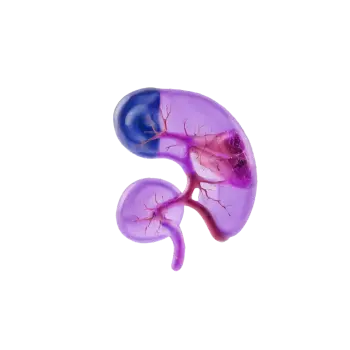Quick version
One in ten Swedes has chronic kidney disease, many without knowing it. A blood test that measures creatinine levels can assess the filtration capacity of the kidneys (GFR), and urine tests can reveal protein or blood. Regular check-ups are recommended for people with risk factors such as high blood pressure, diabetes or family history.
Symptoms to watch out for
- Fatigue and weakness: Caused by anemia or waste products.
- Swelling: Common in legs and feet.
- Changes in urine pattern: Increased or decreased urine volume.
- Loss of appetite and nausea: Caused by waste products in the blood.
- High blood pressure: Both cause and result of kidney damage.
Risks and sequelae
Chronic kidney disease can lead to cardiovascular disease. Research shows that impaired kidney function is a major risk factor for heart attacks. This relationship, cardiorenal syndrome, means that kidney damage and heart problems affect each other negatively.
This is how you can prevent kidney disease
Prevent kidney disease through health checks, tests, balanced diet, exercise and smoking cessation. Treatments include medications, dialysis, or a kidney transplant. Be aware of the risks and symptoms to improve quality of life.
How to test your kidney function
It is relatively easy to test yourself for kidney disease. A blood test can, among other things, measure the creatinine level, which gives an indication of the filtration capacity of the kidneys (GFR), read more about blood test for kidney function here. Urinalysis may also reveal protein or blood in the urine, which are signs of kidney problems. For people with risk factors such as high blood pressure, diabetes or a family history of kidney disease, regular health checks are especially important.
Symptoms to watch out for
- Fatigue and weakness: Caused by anemia or accumulation of waste products.
- Swelling: Common in legs and feet due to fluid retention.
- Changes in urine pattern: Increased or decreased urine volume, foamy or bloody urine.
- Loss of appetite and nausea: Caused by the accumulation of waste products in the blood.
- High blood pressure: Can be both a cause of and a result of kidney damage.
Risks and sequelae
Chronic kidney disease can lead to serious complications, including cardiovascular disease. Research shows that reduced kidney function is as big a risk factor for heart attack as diabetes or established coronary artery disease. People with both kidney disease and heart problems have a worse prognosis because the two conditions negatively affect each other. This association is called cardiorenal syndrome. This means that kidney damage impairs the heart and vice versa, which can lead to a vicious cycle of deteriorating health.
How to prevent kidney disease
By carrying out regular health checks and kidney function tests as well as having a healthy lifestyle with a balanced diet, regular exercise and completely avoiding smoking, kidney disease can be prevented. For those affected, kidney disease can be treated with medications to control blood pressure and blood sugar levels, as well as dialysis or a kidney transplant in advanced cases.
Being aware of the risks and symptoms of kidney disease is crucial to being able to take measures in time and improve the quality of life. If you have risk factors or experience any of the symptoms mentioned, contact your doctor for an evaluation and performance of kidney function test.
























